Scotland v England: Players reflect on teams' first women's international 50 years on
- Published
England v Scotland 1972: The first women's international
It is exactly 50 years since England and Scotland met on a chilly afternoon at Ravenscraig Stadium in Greenock for their first official women's international match.
England recovered from going 2-0 down to win 3-2 and, to celebrate the anniversary, a five-part podcast called 'My Moment in History: Kicking Off the Women's Game' has been produced by the BBC.
Current figures in women's football join individuals involved in that game - both players and people integral in making it happen - to speak to former England defender Anita Asante.
Here are some of the best bits...
'Pushing for women's football cost me my husband'
One person instrumental in getting that first international off the ground was Elsie Cook, who was secretary at the Scottish Football Association before becoming manager of the national team.
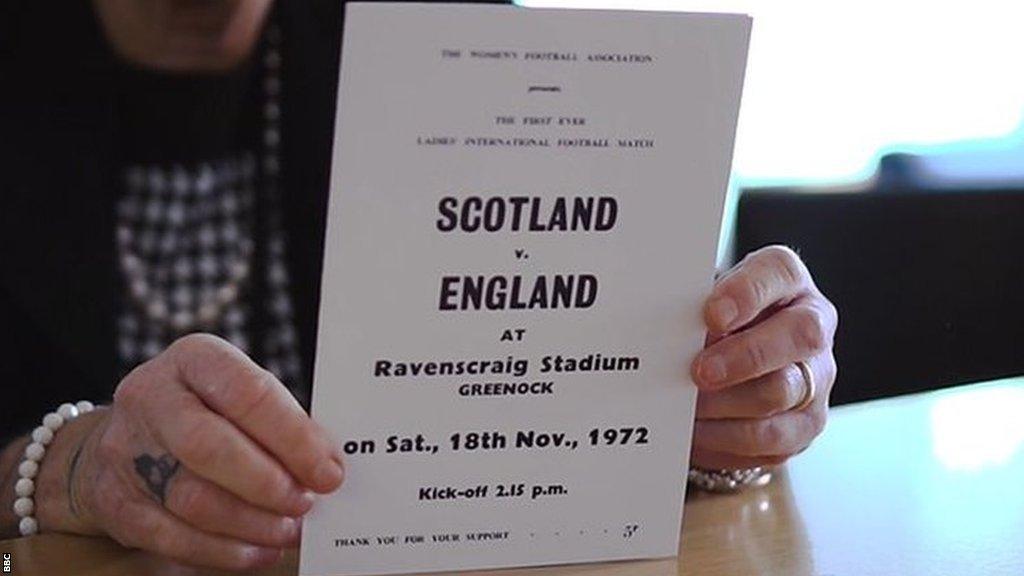
Scotland and England's first official international match took place on 18 November, 1972
"The tension in the dressing room before the game was unbelievable," says Cook.
"When they walked out that tunnel, I had tears in my eyes - you get very, very emotional."
Cook had faced sexism and a lack of resources as she tried to establish a women's football team in Scotland.
"All we wanted to do was play football, to improve the game for girls.
"It didn't matter where we went, the doors were slammed in our face. Why were we ostracised? That was the male attitude in Scotland in those days. The women should be at the sink, they shouldn't be daring to pull on football boots."
Among those unhappy at her passion for football included her husband, who asked her to resign as secretary because he "would not tolerate the idea that women played football". He gave her an ultimatum, she recalls - "It's either me or the football".
She travelled to Edinburgh intending to resign as the secretary... and instead they made her the manager of the Scotland team.
"I had to go back home and tell him - you can imagine how he felt. I had to go and take the route that I intended to take. I had no option.
"It cost me my husband," she adds.
"I was a football suffragette, I had to prove that women could play football, simple."
Scotland 2-3 England 1972: 'We arrived by furniture van, them by coach'
Cook was heavily involved in that first match, from sewing badges on shirts to arranging the pre-match transport, although Scotland player Jean Hunter recalls not everything going to plan.
"We were all waiting on this coach coming to pick us up. And obviously it never arrived.
"The next thing, Elsie said 'you're all getting inside this furniture van, it's taking you to Greenock'. We thought 'this is great' - it was like an adventure."
'Hitchhiking to play for England'
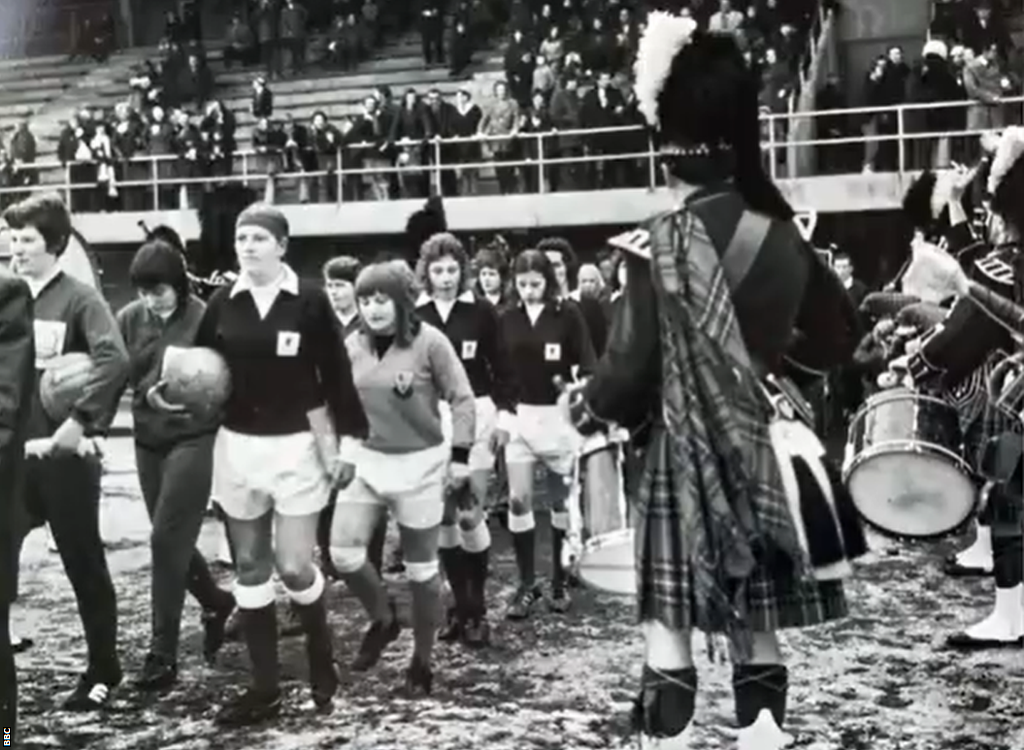
Scotland's Rose Reilly said playing at Ravenscraig was the first time they played in a stadium with a stand
Flying winger Lynda Hale scored the equaliser for England in that first international to make it 2-2, before Jeannie Allott grabbed the winner.
"We were 2-1 down and I can remember Pat Davies passing me the ball," says Hale. "I went past one person, shot and it went right into the bottom right-hand corner."
At the time, she didn't realise the significance of being involved in that first match.
"Yes, I'd played for England, but it only meant a lot to a few family members and maybe someone you worked with because women's football wasn't very big at the time," she said.
Hale, who won seven FA Cup titles with Southampton, says that despite the lack of recognition, some players went to extreme lengths to be able to be involved.
"I was quite lucky because from Southampton there were four players going so we all travelled together by train to London," she said.
"My biggest memory was Jeannie Allott - she came from Crewe and she was only 16. We got up to Waterloo and she was there and we asked how she got there and she said 'I hitchhiked, I stayed at the station all night'.
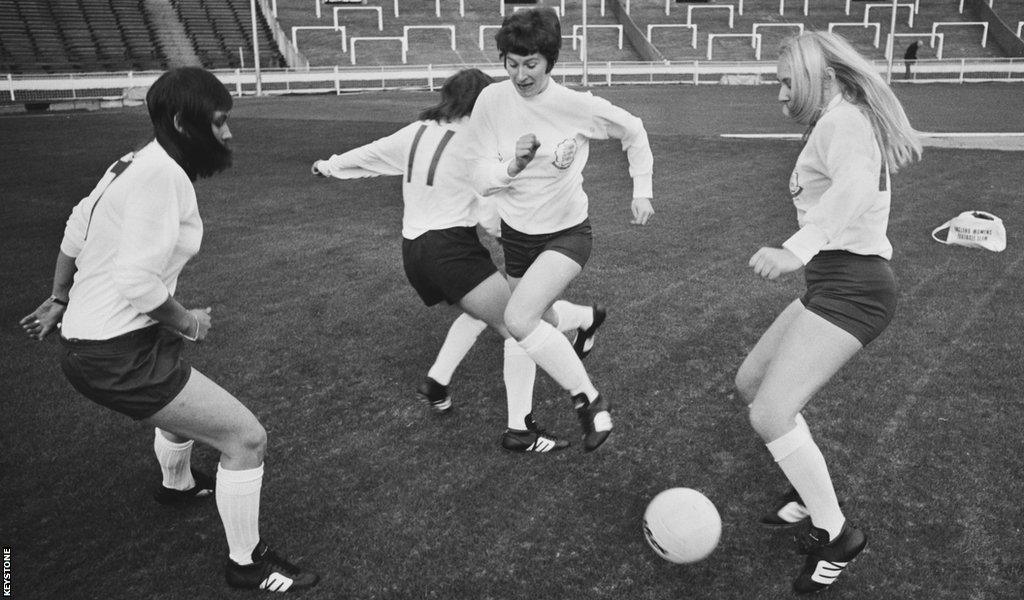
Lynda Hale (left) and Jeannie Allott (right) both played crucial roles in England's victory over Scotland
Allott says hitchhiking was a regular feature of her footballing career.
"I always hitchhiked, whether it was for Fodens Ladies or for the England team. I always hitchhiked from Crewe to London. There was no money, I had no choice," she said.
"Who had money in those days? I couldn't afford a train ticket. I slept there [in a station] overnight and I thumbed it back home the next day.
"When somebody loves football as much I did - and still do - you'll do anything."
'I was told to buy a skirt'
Wendy Owen won her first cap in England's second game away to France in April 1973. For the first match against Scotland, she was an 18-year-old cheering on the team from the bench.
"We went 2-0 down so I was thinking 'oh no, this is terrible, we're going to lose here'," said Owen.
"I was a substitute and I was sat under a blanket on the bench because it was absolutely freezing cold. I've found a write-up and it says there were about 400 people there.
"The moment for me was when we scored this final goal - 3-2! - and I leapt off this bench, blanket flying in the air, and we eventually won."
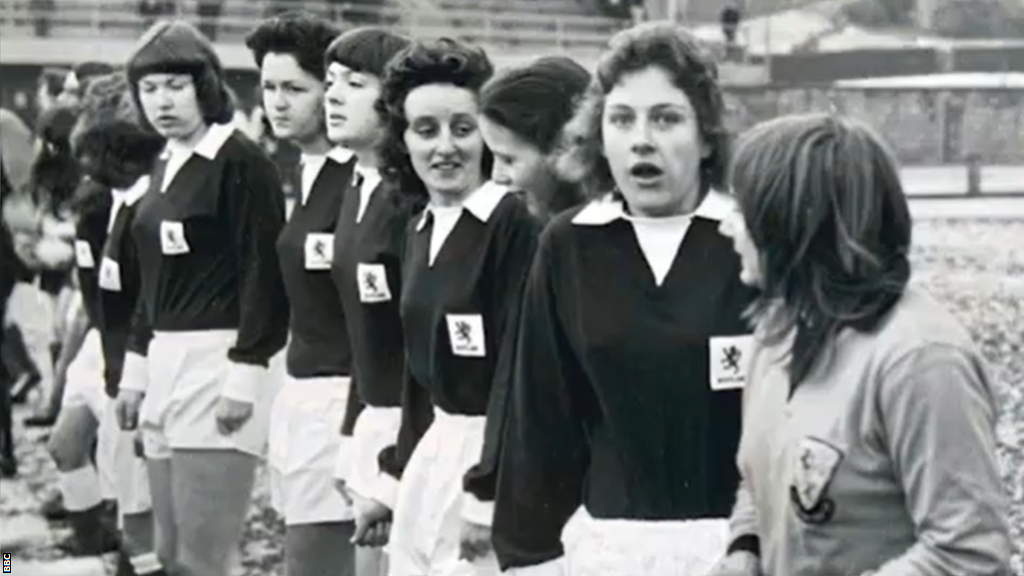
Scotland player Linda Kidd says she has "wonderful memories" of the day - which she says was absolutely freezing, with snow starting during the match
Away from the pitch however, she has a less favourable memory.
"When we received our letter to say we'd been selected, it said at the hotel we were staying in girls weren't allowed to wear trousers and it was a wedding venue so they didn't want to offend any brides," she said. "I didn't even own a skirt! I had to go to a shop and buy a skirt, I wasn't impressed."
Being part of the first England team also saw them invited to Wembley as part of their preparations for a five-a-side exhibition and Owen describes their excitement at rubbing shoulders with the likes of George Best and the 1966 World Cup-winning striker Geoff Hurst.
It was also a first for the stars of the men's game.
"They were very interested because we were the first female England team - they had never seen any female players before," she says.
"We didn't actually realise we were making history back then. We were just girls playing football and we were really pleased we'd been selected for England."
'Nothing compares to standing on the pitch in an England shirt'
Macclesfield Ladies goalkeeper Sue Whyatt, who was 16 at the time of England's first match, was the reserve keeper behind the more experienced Sue Buckett.
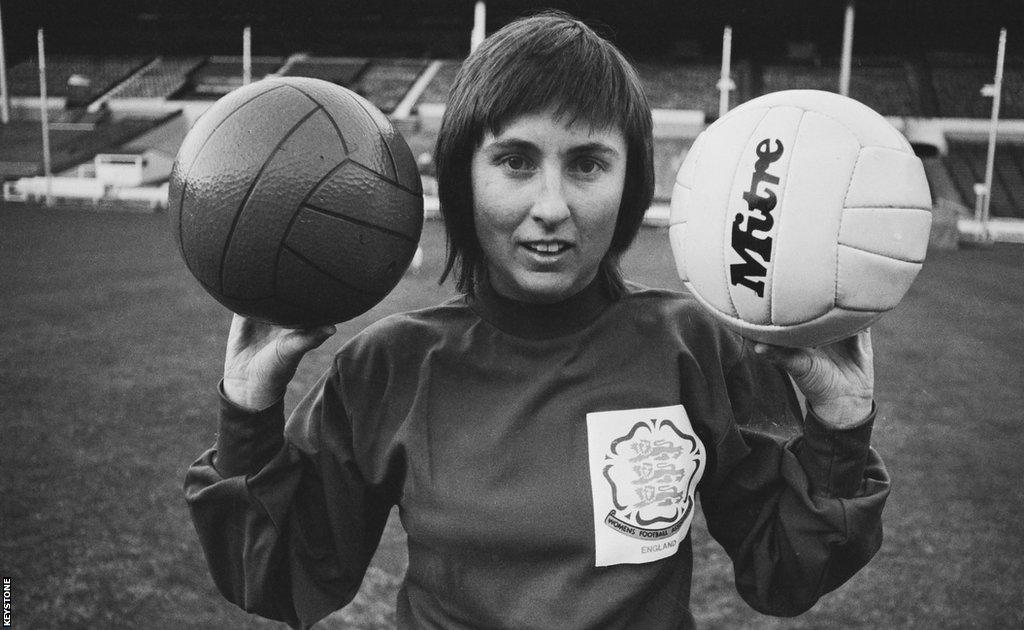
Sue Buckett was England women's first goalkeeper
"As soon as they started to play the national anthem, that was it, I had tears rolling down my face," recalls Whyatt, who says that "never in my wildest dreams did I think there would be an England team - with me on it" when she was growing up.
Her goalkeeping career had started on the streets of north-west England.
"I think the lads chose me to play in goal to be fair - the lads I used to play with on the street," she explains.
"After the 1966 World Cup, we were out playing football every day until it had gone dark so we couldn't see - and we played on the road a lot of the time.
"They didn't want to dive on the tarmac so they said 'Sue, you're in goal'. I loved it, I really did.
"My dad was always very supportive and said 'anything a lad can do you can too, Sue. Do whatever you want to do'."
That upbringing led her to Macclesfield Ladies and then being involved in England's first squad - aged 16 and playing alongside much older players. She says it was a "daunting" experience. So how close did she come to making it on to the pitch?
"I did think, part way through the match, they had a bit of a collision in the goalmouth, and I thought 'is this it, am I on?' But Sue [Beckett] was up and back out there again," she said.
Whyatt, who was among those to campaign for the Football Association to recognise those England pioneers, adds: "Although I have children and grandchildren, I have to say nothing compares to standing on that pitch the very first time with an England shirt on."
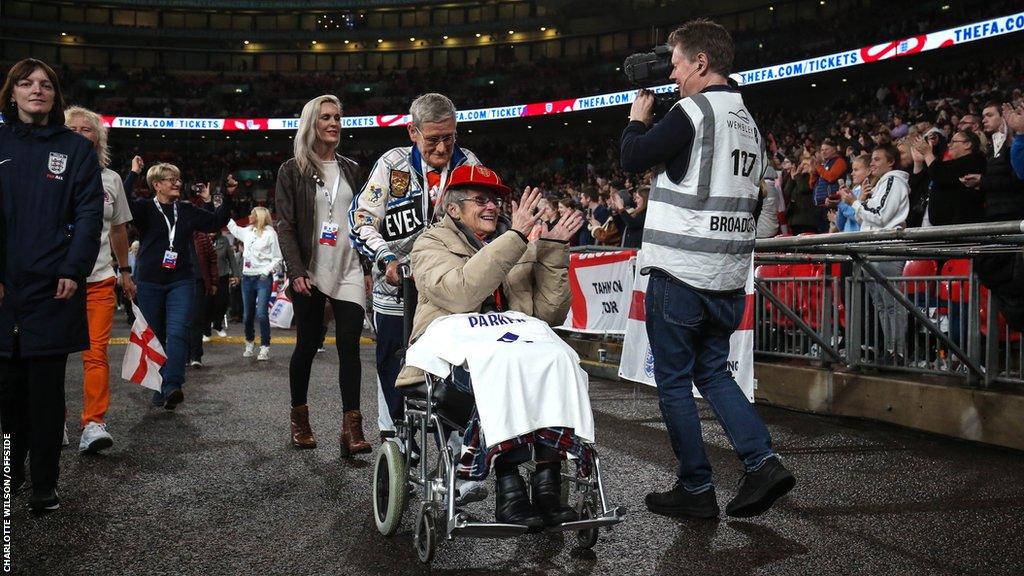
England's first captain Sheila Parker and other players from the 1972 squad received honorary caps at Wembley last month when the Lionesses played the USA